Covid in Scotland: The latest casespublished at 17:36 GMT 13 January 2023
A weekly update on Covid-19 cases, hospital admissions and deaths in Scotland.
Read MoreMost Covid restrictions in Scotland will end next week, the first minister has confirmed, with the country moving "beyond level zero" from 9 August
All premises that are currently closed - including nightclubs - will be able to open, with social distancing measures and limits on gatherings removed
But people must still wear face coverings in indoor settings such as shops
Double vaccinated adults will not automatically have to self-isolate for 10 days if they come into contact with someone who tests positive
Instead, they will take a PCR test and can end their isolation if they test negative, with similar rules in place for under-17s
Current mitigation measures in schools, such as distancing and facemasks in secondary schools, will remain for now
Ms Sturgeon also says the vaccination programme will have to continue for some time
A further 1,016 positive tests have been recorded in the past 24 hours, along with the deaths of a further nine people who had previously tested positive
A weekly update on Covid-19 cases, hospital admissions and deaths in Scotland.
Read MoreFirst Minister Nicola Sturgeon has updated parliament on the latest stage of easing of Covid restrictions.
From Monday (9 August), Scotland will move beyond the current level 0, lifting most of the remaining legally imposed restrictions.
This is most notably removing physical distancing and limits to the size of social gatherings.
It also means that from 9 August, no venues will be legally required to close.
However, a number of measures will remain in place.
These include:
1.Face coverings must be worn in all the same indoor settings. This is likely to be law for some time to come.
2. Indoor hospitality and similar venues will continue to collect the contact details of customers.
3.Localised restrictions will be used if necessary to control outbreaks. Travel restrictions could also be used.
4.The advice remains to continue home-working where possible.
5.Large-scale events will, for a limited period, need to apply for permission. This applies to outdoor events of more than 5,000 and indoor events of more than 2000.
Rules of self-isolation to change
Changes in schools

Question from Janet in Glasgow
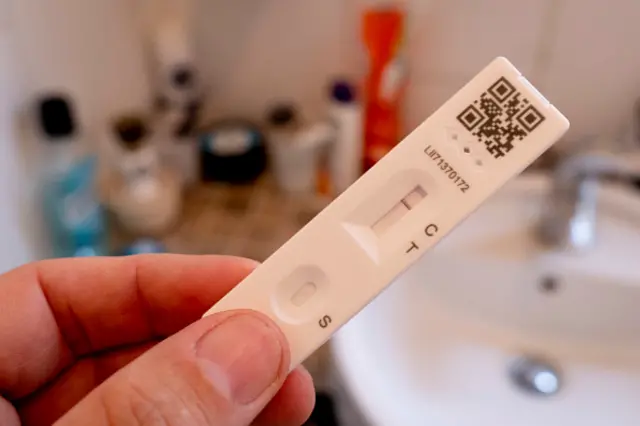 Image source, Getty Images
Image source, Getty ImagesEveryone is now being offered rapid Covid tests which can be taken at home twice per week. You do the test yourself, and the result is available after 30 minutes.
Lateral flow home test kits are free, and can be ordered online to be delivered in the post, external. Or you can pick them up from a convenient location, external.
The public are asked to take these tests - which are for people without symptoms - to help find cases of Covid that could otherwise go undetected.
This is because about one in three people with Covid do not have any symptoms - although they can still spread the virus to others, who may then get sick.
SNP MSP Elena Whitham raises the concerns of the many people who are taking immunosuppressant drugs, which could reduce the effectiveness of the Covid vaccine.
She asks if immunosuppressed people could be given antibody tests to assess the effectiveness of the Covid vaccination.
The first minister says currently the advice is to use antibody tests to improve understanding of Covid.
However clinicians, including GPs, have the discretion to request an antibody test for an individual if they think the result will be of benefit to the clinical management of that patient, she says.
Ms Sturgeon says the vaccine offers significant protection to the general population but there is not yet evidence of how effective it is for people with an impaired immune system.
She says people in this situation should continue to be cautious and take sensible precautions.

Question from Stuart in Glasgow
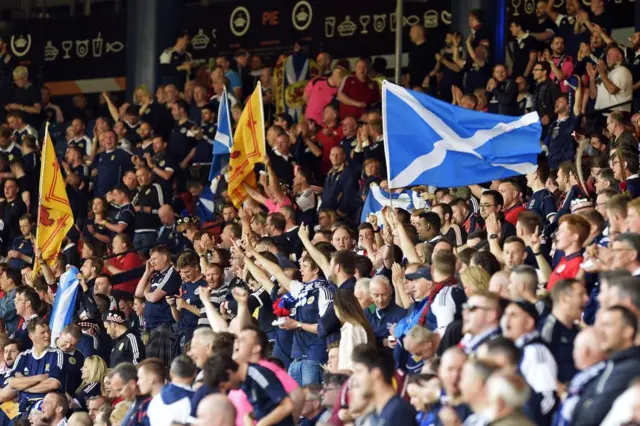 Image source, Getty Images
Image source, Getty ImagesThe first minister has confirmed today that outdoor events can welcome up to 5,000 fans from 9 August without having to apply for extra permissions.
But if the crowd is going to exceed 5,000 people, then the organisers must still apply to their local authority for permission.
Organisers have to submit an operations and risk assessment to prove they are keeping spectators safe.
The local authority will then consider the plans and can grant permission.
This application process will only remain "for a limited period", Ms Sturgeon said.
Andrew McRae, policy chairman for the Federation of Small Business (FSB) Scotland, said business leaders would feel "a cocktail of elation and worry" after hearing the statement.
"The removal of the public health restrictions doesn’t guarantee the recovery of either an individual business or a local economy," he said. "Operators now face trading conditions permanently changed by the crisis and new debt that they’ll need to manage in the months and years to come."
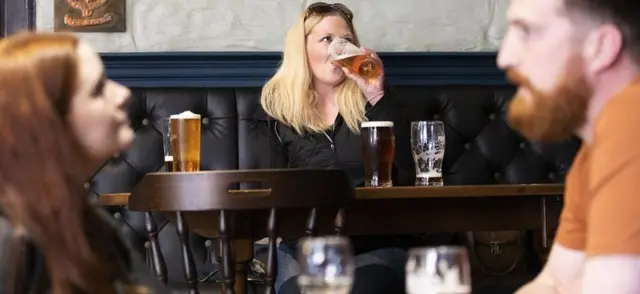 Image source, PA Media
Image source, PA MediaBusinesses have welcomed the first minister's announcement, including the chief executive of the Scottish Beer and Pub Association Emma McClarkin - who said more than 200 pubs would be able to reopen for the first time.
She said: “This is the confirmation that so many in our sector have been desperate to hear. It is fantastic news for our pubs which have suffered more than most sectors over the last 15 months.
"It is estimated that Scotland has lost 285 pubs for good since the start of the pandemic and hundreds more remaining at risk, with a need to reduce the tax and regulatory burden that they face."

Question from Dean in Edinburgh
 Image source, Getty Images
Image source, Getty ImagesYes, indoor events, such as concerts will be able to make a "careful return", Ms Sturgeon said.
But, she said that for a "limited period" organisers of indoor events of more than 2,000 people (and outdoor events of more than 5,000 people) would have to apply for permission.
This will allow local authorities to check that there are safety measures in place to reduce risk.

 Glenn Campbell
Glenn Campbell
BBC Scotland Political Editor
Nicola Sturgeon is desperate not to call it “freedom” day or to declare “victory” over the virus but it is a big moment in the pandemic.
From next Monday most Covid restrictions will end in Scotland - almost 17 months after the initial lockdown.
That includes lifting (except in schools) the one metre social distancing rule that limits capacity in restaurants and on ferries and prevents the operation of nightclubs.
This is possible, we’re told, because the rate of new infections and hospital admissions is starting to decline and the vaccination rate is rising.
The big difference with England is the measures that will remain in force.
Mask wearing will continue to be a requirement on public transport and in shops and for at least the next six weeks in Scottish schools.
The Conservatives say ongoing restrictions will “hold Scotland back” but the first minister insists continued caution will ultimately help economic recovery.
Lib Dem MSP Liam McArthur asks the first minister to rule out domestic vaccine passports.
Ms Sturgeon says again that she is far from convinced they are the right thing to do but she does not want to close down the debate at this stage.
"If there is one thing I have learned over these grim, challenging, difficult 18 months it is that, in the face of an infectious virus that kept adapting to make the challenge more difficult, I don't think it is sensible just to rule things out for ideological or other reasons," she says.
Allow X content?
This article contains content provided by X. We ask for your permission before anything is loaded, as they may be using cookies and other technologies. You may want to read X’s cookie policy, external and privacy policy, external before accepting. To view this content choose ‘accept and continue’.
Scottish Greens co-leader Patrick Harvie says he is concerned by the continued emphasis on Covid status certificates - so-called vaccine passports.
He says he is particularly concerned in relation to "high-risk venues" such as nightclubs.
Mr Harvie says vaccine passports raise human rights implications if the ability to live our lives is dependent on our health status.
First Minister Nicola Sturgeon says Mr Harvie is right that vaccines do not eliminate all risk and harm despite being hugely effective.
However, she denies that she is placing "emphasis" on vaccine passports. She says the app being developed will have the Covid status functionality but there are no plans to immediately use it.
"I am highly cautious about Covid passports for all the reasons that Patrick Harvie has set out," she says. "But there is a debate to be had about whether they could play some part."
Allow X content?
This article contains content provided by X. We ask for your permission before anything is loaded, as they may be using cookies and other technologies. You may want to read X’s cookie policy, external and privacy policy, external before accepting. To view this content choose ‘accept and continue’.
Lucy Whyte
BBC Scotland education correspondent
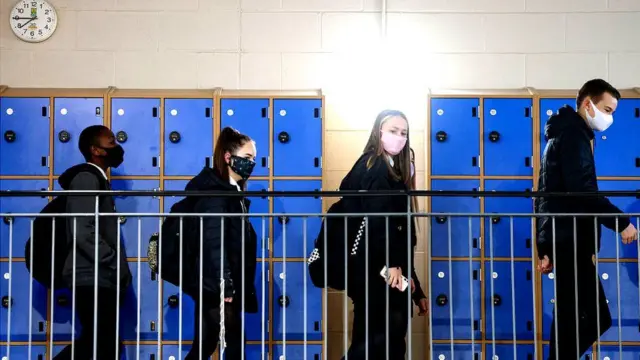 Image source, Getty Images
Image source, Getty ImagesSchool restrictions are now tougher than those for the rest of society.
Secondary pupils have to wear a mask at all times and one metre distancing remains between adult staff.
Teachers were given a guarantee that no rules would change on day one but these current restrictions look set to remain for at least six weeks.
It shows a nervousness from the government about large groups of unvaccinated teenagers mixing when term starts - as early as next week for some.
The return of schools last August saw the beginning of an upward trend of cases. Ministers are hoping that holding their nerve now, keeping strict rules for pupils, will prevent history repeating.
Scottish Labour leader Anas Sarwar says vaccination has been key to reducing harm from Covid.
"We must maintain the progress and intensity of the programme," he says.
In recent weeks the seven-day average rate of vaccinations has reduced, Mr Sarwar says.
He calls for all barriers to vaccination to be removed - saying there should be more pop-up vaccination centres in hard-to-reach areas and even door-to-door jabs.
First Minister Nicola Sturgeon says the vaccination programme is going "extremely well" but she is looking at all possible ways to get people to access vaccination services.
Allow X content?
This article contains content provided by X. We ask for your permission before anything is loaded, as they may be using cookies and other technologies. You may want to read X’s cookie policy, external and privacy policy, external before accepting. To view this content choose ‘accept and continue’.
Scottish Conservative leader Douglas Ross asks if the first minister is considering imposing another local lockdown or travel ban and how will it be enforced.
He calls Ms Sturgeon's announcement a "mixed bag", but she argues it is "sensible and cautious", accusing the Conservatives of "trying to undermine" her communication at times.
On future lockdowns, she said: "I fervently hope that will not be necessary", adding that the risk of such measures will be minimised if people continue to exercise care and caution.
However, she concludes by saying if she believed a lockdown was necessary to curb an outbreak or new variant that put lives at risk, "no matter how unpopular I would take that decision, because that’s what I’m elected to do".
Allow X content?
This article contains content provided by X. We ask for your permission before anything is loaded, as they may be using cookies and other technologies. You may want to read X’s cookie policy, external and privacy policy, external before accepting. To view this content choose ‘accept and continue’.
Nicola Sturgeon has confirmed almost all of Scotland's remaining Covid-19 restrictions are to end from 9 August. Here are the main points:

Question from Daniel in Greenock
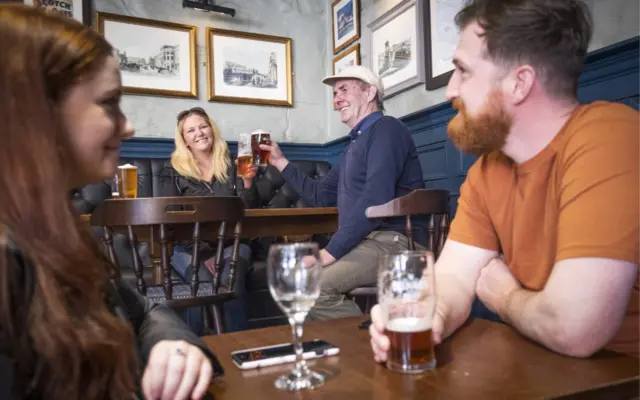 Image source, PA Media
Image source, PA MediaYes, you will still have to provide your contact details.
The first minister confirmed in her statement that Scotland's contact tracing service - Test & Protect - would continue to contact-trace positive cases of Covid.
She said there would be an "ongoing requirement for indoor hospitality and similar venues to collect the contact details of customers" to assist with this.
 Lisa Summers
Lisa Summers
BBC Scotland Health Correspondent
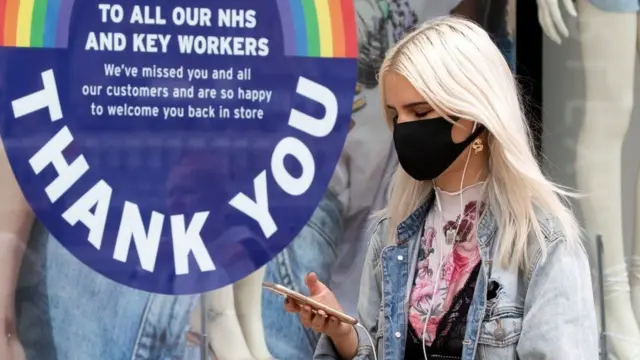 Image source, PA Media
Image source, PA MediaTwo weeks after lifting restrictions in England, the predicted spike of 100,000 new cases a day has not materialised.
That bodes well for Scotland to follow suit. Scotland was the first part of the UK to see a big surge in cases at the start of July but since then, the data has been positive and even the more cautious scientists say it looks good to proceed.
Some experts believe one thing that has helped is that behaviour has not significantly changed. We are not in contact with as many people, and many have continued to keep a distance. With vaccines doing such an amazing job, could small efforts like this be enough to keep the virus at bay?
What is around the corner is a bit tricky to predict.
We will see a return to schools and universities in the next few weeks, coupled with the end of the holiday season and cooler weather on the horizon. That’s why things like the wearing of face coverings and an encouragement to work from home will continue for now.
The hope is the worst is behind us, but Covid has taken us by surprise before - it still could now.

Question from Stuart in Melrose
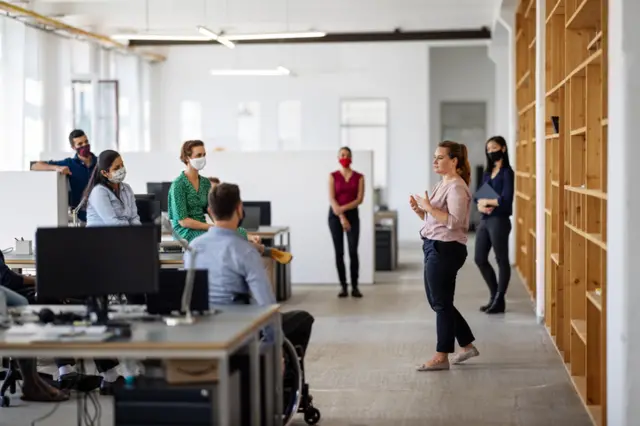 Image source, Getty Images
Image source, Getty ImagesNot yet, if you can work from home.
The first minister has said that the advice will continue to be work from home where possible.
She said: "We will continue to advise home working where possible for now.
"I know most businesses are not planning a wholesale return to the office, while recognising that a return for some staff will be beneficial to them and their employers.
"It is vital that this gradual approach continues."
She also said the Scottish government was encouraging employers to consider adopting a "hybrid" model of home and office working - which she said might have "benefits beyond the need to control a virus."
The first minister ends her statement by saying people still need to be "careful, cautious and sensible", even as legal restrictions are lifted.
She says she hopes the restrictions that will be lifted next Monday will never have to be reimposed. "But no-one can guarantee that", she says.
"This virus remains a threat - and as we enter winter, it may well pose challenges for us again," she says.
Ms Sturgeon adds that when restrictions are lifted it inevitably gives the virus more opportunities to spread.
"It becomes even more important for us to remember the basic actions that can reduce risk," she says.
Guidance for universities and colleges on operating beyond level zero has now been published, Nicola Sturgeon confirms.
Students will be asked to take a PCR test before moving to student accommodation and then asked to test twice a week thereafter.